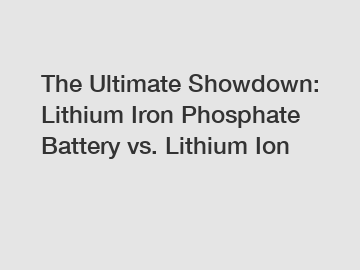The Ultimate Showdown: Lithium Iron Phosphate Battery vs. Lithium Ion
Welcome to the ultimate battle of the batteries! In today's tech-driven world, where portable devices demand long-lasting power sources, lithium-based batteries have risen to the forefront. In this blog, we will dive deep into the intriguing face-off between two notable contenders: Lithium Iron Phosphate (LiFePO4) and Lithium Ion (Li-ion) batteries. Strap in as we explore these powerhouses and uncover the pros and cons of each technology to help you make an informed decision.
1. Understanding Lithium Iron Phosphate (LiFePO4) Batteries:
LiFePO4 batteries have gained significant attention due to their stellar combination of safety, longevity, and reliability. They have a stable chemistry, which means they are less prone to thermal runaway or explosion. Consequently, LiFePO4 batteries are considered safer than Li-ion batteries, especially for critical applications like electric vehicles (EVs) and renewable energy storage systems.

LiFePO4 batteries boast an impressive lifespan, with the capability to endure thousands of charge cycles, making them ideal for long-term use. Additionally, they offer excellent performance in cold weather conditions, making them a preferred choice for demanding outdoor applications.
2. Delving into Lithium Ion (Li-ion) Batteries:
Li-ion batteries have become the golden standard in the consumer electronic world, powering smartphones, laptops, and tablets. Their compact size, high energy density, and light weight have made them a go-to option for manufacturers and consumers alike.
These batteries utilize various cathode materials like lithium cobalt oxide (LiCoO2) and lithium nickel manganese cobalt oxide (LiNiMnCoO2), offering different performance characteristics. Li-ion batteries exhibit a higher energy density compared to LiFePO4 batteries, enabling them to hold a greater charge and deliver more power in a compact package.
3. Comparing Key Features:
a) Safety: LiFePO4 batteries are less prone to thermal runaway, making them inherently safer than Li-ion batteries. However, advancements in Li-ion battery technology, such as the use of solid-state electrolytes, have significantly improved their safety profile.
b) Lifespan: LiFePO4 batteries outshine Li-ion batteries in terms of longevity. While LiFePO4 batteries can last up to a decade or more, Li-ion batteries generally have a shorter lifespan, typically around 2-3 years. However, it's worth noting that this may vary depending on usage patterns and environmental conditions.
c) Energy Density: Li-ion batteries provide a higher energy density compared to LiFePO4 batteries. This means that Li-ion batteries can store and deliver more energy in a smaller and lighter package. This advantage is crucial for portable electronics that emphasize size and weight.
d) Charging Efficiency: LiFePO4 batteries are more efficient when it comes to charging and discharging rates, allowing faster charging times. Li-ion batteries, on the other hand, can be charged quickly but may pose a higher risk of degradation if charged too rapidly.
4. Determining the Ideal Application:
Both LiFePO4 and Li-ion batteries have their unique strengths and applications:
- LiFePO4 batteries are ideal for heavy-duty applications such as EVs, solar energy storage, and off-grid power systems that require long-lasting, reliable power.
- Li-ion batteries are more suitable for portable devices like smartphones, laptops, and wearable technology, where space, weight, and immediate power availability are key factors.
5. Conclusion:
Choosing between LiFePO4 and Li-ion batteries ultimately depends on your specific power requirements and application. If you prioritize longevity, reliability, and safety, LiFePO4 batteries are your best bet. On the other hand, if you seek high energy density and compactness, Li-ion batteries are the way to go. Both technologies are constantly evolving, with ongoing research focused on enhancing their strengths and addressing their limitations.
Whichever battery type you select, rest assured that the future holds exciting advancements in energy storage, ensuring that we have access to reliable and long-lasting power sources for our ever-expanding technological needs.
For more lithium iron phosphate battery cells, 50 ah lifepo4 battery, lishen 280ah cellsinformation, please contact us. We will provide professional answers.


